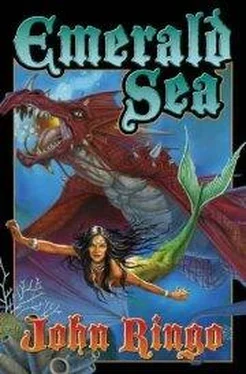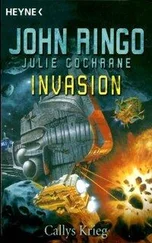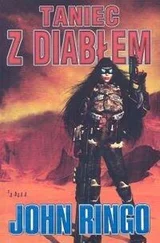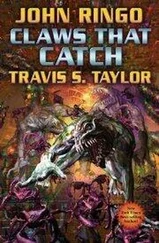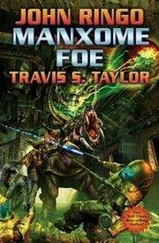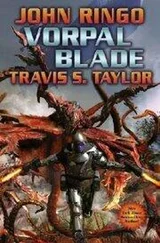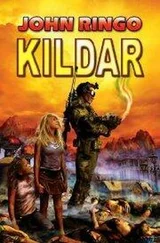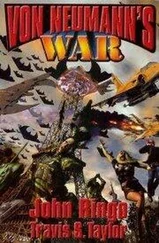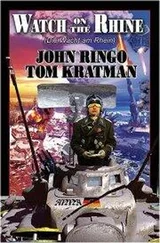“If we found something tastier for them they might eat,” Herzer suggested.
“Yeah, and then the next time they didn’t like their food they’d wait until we gave them something better,” Jerry said. “No, they’re just going to have to eat it or not.”
Chauncey looked through the bars of his stall and mewed piteously at Herzer.
“I’m sure the cook has some scraps left over,” Herzer said. “What if we just gave them a few? That might make them hungry enough they’d eat their slop.”
“I dunno,” Jerry said. “It goes against the grain.”
“If I’d been puking,” Herzer said, mentally adding which I have , his throat was still raw with it, “I wouldn’t want something that looked like puke.”
“You have a point.”
Herzer, getting lost only one time, made his way to the main kitchen, which the sailors insisted be called a “galley,” of the ship and caught the eye of one of the NCOs.
“A couple of the dragons are badly off their feed,” he said. “We’re hoping some scraps will get them eating again.”
“All the edible garbage goes in those pails,” the petty officer said, pointing to a line of buckets lashed to the wall. “Take whatever you want; we just pitch it over the side.”
Herzer went over and checked them over. Most of the garbage consisted of ship’s bread and vegetables, but one bucket had a fair amount of stew from the evening meal in it. He untied that one and started to carry it back to the dragons.
“Hang on, sir,” the petty officer said. “Johnson, carry that for the lieutenant, then head back here when you’re done. Bring the bucket.”
Herzer wasn’t sure if the petty officer just wanted his bucket back or if he was getting another class in “enlisted men do, officers supervise” but he followed the sailor, who didn’t get lost, back to the dragon deck.
The scraps, when added to their slop, were a big hit with the two dragons. They got enough meat that they started sucking on their slop right afterwards.
“Sir, if you don’t mind,” Johnson said. “We can try to segregate the meat that gets thrown away. And there’s bones and things that don’t get used, too.”
“As long as the PO says it’s okay, that would be great,” Herzer said. “Johnson, wasn’t it?”
“Yes, sir.”
“Thanks for your help,” Jerry said. “If you ever want a ride, assuming we can get them back in the air…”
“That would be great, sir.” The sailor grinned. “I’d better get back.”
“Thanks again,” Herzer said. When the sailor had left, Herzer grinned at the rider. “I think you’ve got a convert.”
“Oh, we’ve had plenty of people ask us about rides,” Jerry said. “Or even becoming riders. Especially since we’re down two.”
“One of them being me,” Herzer said. “Sorry.”
“Not a problem,” Jerry replied. “Duke Edmund has been fairly clear on that. As soon as the weather calms down, and assuming as I said that we can take off and land in this mess, we’ll see about getting you trained. But I warn you, landing on this thing is not easy.”
“You need at least one more rider than you have dragons,” Herzer said. “Or, at least, dragons in the air.”
“Why?”
“For the LSO. I don’t know that I’d have been able to do it if I hadn’t had that one experience with riding. It gave me a grasp of what I was doing.”
“Point,” Jerry said. “Well, since we’ve got the wyverns settled and there’s not much going on, I might as well start with giving you the ground school portion.”
“Ground school?” Herzer said.
“You have no idea.”
For the next two days, as the weather continued foul, Jerry and Vickie between them tried to cram all the theoretical aspects of dragon riding into Herzer’s aching head. At night he went to bed with terms like “yaw” running through his head and every morning it started all over again.
He discovered what had been happening in his brief flight when he’d been trying to move the dragon around in the air. He learned about optimum glide paths, methods of spotting thermals, and the anatomy of the wyverns. The wings were not, as he’d thought, just flesh, blood, skin and bone, but were a complex web of far more advanced materials including biologically excreted carbon nanotubes.
“It’s the only way the wing bones could support their weight and powered flight,” Vickie explained. “There’s no way that bone and skin alone could do it. The largest previous flyer was a fraction of their size. And there’s some indication that overall air pressure was higher in the Jurassic.”
“So Joanna’s got this in her, too?” Herzer asked, looking at the sketch. “They’ve got to be some of the strongest ‘natural’ material on earth.”
“They are,” Vickie said, frowning. “We try not to make too much of a point of it.”
“I can imagine why,” Herzer said, frowning in his own turn. “There’s a lot I can imagine to do with wyvern wings.” The bones would make excellent weapons and the primary skins would make tremendous armor. Assuming you could figure out a way to cut it.”
“As to Joanna, yes,” Vickie said. “But more so. How do you think she keeps her head up in flight?”
“Bloody hell,” Herzer said. “That’s… a lot of nanotubes.”
“It’s one of the reasons they grow so slowly,” Vickie said. “And they’re continuous filament monomolecules. One of the strongest substances ever made.”
“Cutting them would be a stone bitch,” Herzer said. “Which means their wings aren’t going to be subject to puncture in combat.”
“Trust you to think of that.” Vickie chuckled. “But they can be dislocated. It’s one of their big weaknesses. But, no, they don’t break wing bones or tear wings.”
“If they were fighting on the ground the thing to do would be to wrap their wings around them,” Herzer thought. “Nothing would get through it.”
“They can be superficially scratched,” Vickie said. “And that takes a long time to heal. But their wings are, for all practical purposes, invulnerable. On the other hand, they take a lot of care and feeding.”
Which they did. On active days they required several feedings per day, totally nearly their own body weight. On inactive days they required far less, but every day it was excreted.
“Fortunately, they tend to let go in air,” Jerry said, as he was covering that aspect. “But with them cooped up as they are…”
“It gets messy.” Herzer grinned.
“That apparently was passed on, and Evan the Ever Efficient planned for it,” Jerry said. “The ship really does have enough stores to support them for a hundred days, but that’s at the cost of crew. This is a really skeleton crew for a ship this size.”
“I’d noticed,” Herzer said.
And the skeleton crew was kept busy. While Herzer was cramming his head with information about dragons the crew was busy fighting the storm. Again and again the sails had to be trimmed as the wind backed around, died down and then blew back up.
It was rough and nasty and apparently the life of the Navy. Herzer decided that they could keep it.
* * *
Working the night shift was not helping with Joel’s mission. He’d picked up a rumor that the head cook was peculating, probably with the help of some of the victuallers that supplied the ship. But that didn’t make him a spy, although Joel would include it in his report.
The problem with working the mid-watch was that he had minimal interaction with the officers. If there was a New Destiny agent on-board, the most damaging position would be among the officers. And although they rotated shifts so he’d been around each of them, if any of them were communicating with New Destiny, it wasn’t clear.
Читать дальше
